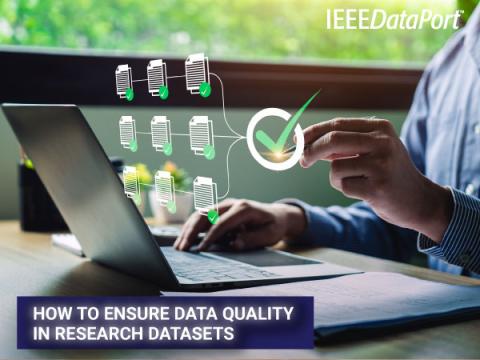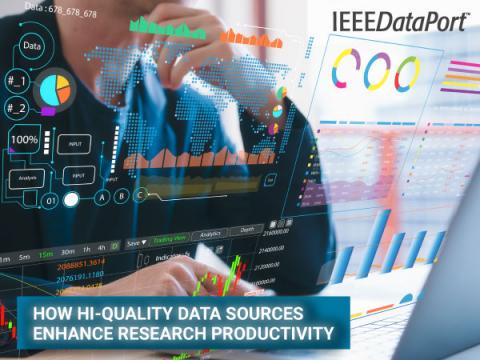Choosing the Right Research Database for Your Institution
Selecting the right research database is one of the most critical decisions an academic institution can make. As universities increasingly adopt data-driven approaches to enhance their research capabilities, having access to the right database can significantly impact how researchers operate, collaborate, and innovate. Yet, finding the perfect solution comes with challenges such as budget limitations, data accessibility, and scalability.
Below, we provide a comprehensive guide to help academic leaders, including deans, research officers, and academic researchers, identify the most suitable research database while positioning IEEE DataPort as the go-to resource.
Why Your Choice of Research Database Matters
The right research database can make or break your institution's academic success. Here's why:
Enhancing Research Efficiency
A well-organized database for research transforms how teams work. It offers tools to streamline workflows, minimize redundancy, and maintain clarity regarding datasets. Advanced research databases such as IEEE DataPort provide features like powerful search tools and structured dashboards to help researchers quickly access and use the data they need, saving valuable time in the process.
Alternatively, a poorly designed database with clunky interfaces or limited search functionalities can slow research to a crawl, creating bottlenecks and impeding progress.
Fostering Collaboration
The right academic research article database enhances collaboration within and between institutions. Features like dataset-sharing capabilities, as offered by IEEE DataPort, empower seamless collaboration among departments or even globally. This is essential for interdisciplinary studies and large-scale research projects where working with external collaborators is crucial.
When datasets are easily shared and accessed, collaboration takes on new dimensions, enabling teams to pool knowledge and generate impactful discoveries more effectively.
Boosting Institutional Prestige
Access to comprehensive and quality research databases strengthens your institution’s academic credibility. By enabling breakthroughs, driving impactful studies, and producing reliable findings, high-quality databases for research elevate the public perception of your institution. With a robust database like IEEE DataPort, researchers can make their findings and datasets accessible to a global audience, increasing the visibility and impact of their work.
More Than Just Data Storage
A great research database isn’t just data storage—it’s a data management powerhouse. From tracking citations to automating repetitive tasks, advanced tools help keep research data structured, easily accessible, and compliant with funding requirements like open-access mandates.
Pro Tip: To learn how innovative data tools drive institutional success, check out this webinar by IEEE DataPort.
Consider These Key Factors When Choosing a Research Database
Making the right decision begins with understanding your institution's needs. Below are vital factors to consider:
Budget
Research databases come at various price points. Look for solutions that provide cost-effective plans, such as IEEE DataPort’s flexible pricing. Don’t forget to account for hidden costs such as system upgrades, training, or additional bandwidth.
Data Accessibility
Your database must support open access where possible. Accessibility enhances equity and impact by allowing a wider audience to use the research. Databases like IEEE DataPort support public datasets, which can help fulfill funder mandates.
Searchability
Comprehensive search capabilities save time and improve user satisfaction. Databases optimally organized with tags, filters, and search tools enable researchers to find precise datasets quickly.
Usability
A user-friendly interface is crucial, especially for researchers juggling multiple priorities. Tools like drag-and-drop functionality or seamless integration with research tools make databases much easier to adopt.
Coverage
Does the database meet the specific subject needs of your institution? For instance, a university focusing on engineering will benefit from discipline-specific resources like IEEE DataPort’s vast library.
Security
Research often involves sensitive data. A great database ensures compliance with industry standards for encryption, access control, and secure backups.
Scalability
Your database must grow as your institution expands. Look for cloud-based solutions like IEEE DataPort that support large datasets while remaining scalable to future needs.
Explore more tips for evaluating databases at Mt. San Antonio College's research guide.
Understanding the Pros & Cons of Each Type of Research Database
There’s no one-size-fits-all solution. The best research databases vary by type, each with unique benefits and drawbacks:
Proprietary Databases
Proprietary databases are privately owned and provide unique benefits like access to specialized datasets or advanced tools. However, they can come with significant costs and subscription models. Institutions gain high-quality, exclusive research datasets, but these databases may limit access for affiliated researchers due to licenses.
Learn more about proprietary databases.
Open-Access Databases
Open-access databases are becoming highly popular due to their inclusivity. They promote data accessibility and often feature free public datasets, supporting collaboration and equity. However, because they rely on contributors to share data, quality or completeness might vary.
Check out the open-access opportunities from IEEE DataPort.
Discipline-Specific Databases
Focused on specific fields, these academic research databases are invaluable for institutions specializing in certain disciplines. For instance, engineering institutions benefit immensely from the comprehensiveness of IEEE DataPort’s datasets in AI, IoT, and energy systems.
Explore how IEEE DataPort caters to discipline-specific needs:
Use These Steps to Evaluate & Select the Best Research Database
Follow these five practical steps to assess your options:
Assess Institutional Needs
Determine areas like scalability, security, and specific data requirements.
Explore Database Features
Compare platforms for features like usability, searchability, and public dataset availability.
Weigh Pros & Cons of Each
Evaluate your shortlisted database types against faculty and researcher requirements to ensure alignment.
Request a Demo
Nothing beats practical experience. Request a demo to explore the interface and tools available to subscribers.
Seek Feedback
Include researchers and data managers in the selection process. Their feedback will ensure the database meets day-to-day requirements.
For a deeper look into evaluating research tools, the IEEE DataPort team also offers guides like this one.
Choose the Right Research Database with Confidence
Selecting the right research database directly impacts your institution’s capabilities, efficiency, and global recognition. With unmatched features like advanced search tools, public dataset storage, and scalability, IEEE DataPort stands out as a solution that combines innovation with academic needs.
Whether you’re managing long-term data storage or improving collaboration, IEEE DataPort is built to support the evolving needs of modern research.
Take action now: Explore IEEE DataPort and simplify research database selection. Register for a free IEEE DataPort account today.
- 572 reads



